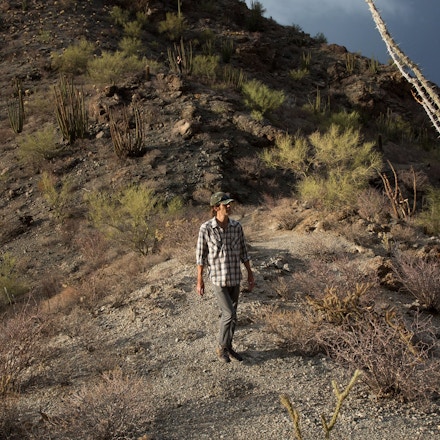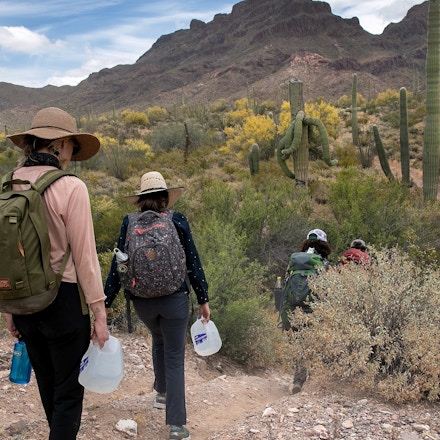HOW THE BORDER PATROL BEGAN ITS INVESTIGATION INTO NO MORE DEATHS VOLUNTEER SCOTT WARREN
IN THE SPRING of 2017, a plainclothes Border Patrol agent met a source at a gas station in the sleepy town of Ajo, Arizona, some 40 miles north of Mexico. The meet-up was facilitated by a colleague. The source had information about human smuggling but wanted to remain anonymous, fearing retaliation for talking to law enforcement, specifically the Border Patrol, about what they knew.
John “Rambo” Marquez had nearly a decade of experience in the patrol. His unit, known as “Disrupt,” fancied itself an elite outfit designed to take down complex criminal smuggling networks. They didn’t let the fact that they weren’t special agents, like those from the DEA or FBI, and didn’t have the training or authorities to carry out the kind of investigative work those agencies do, stop them from pursuing potential leads.
And this was a lead. Not about an actual criminal group or some violent border crimes, but a lead none the less. The source informed Marquez that Mimi Phillips, a caterer and owner of a breakfast business in Ajo, was harboring illegal border crossers at a building known locally as “the Barn.” Some residents, the source said, had taken to calling the facility, long used by groups that search for missing and dead migrants, a “stash house.”
Not only that, the source said, Phillips was a member of a nonprofit that, according to its website, was made up of “concerned people from all walks of life who have joined forces” to promote environmental conservation practices and educate the public on “protecting and respecting valuable biological and cultural resources and traditions.”
It got worse, the source said. The nonprofit also worked with self-described humanitarian groups — the kind that use the Barn — that leave water in the desert so that people don’t die.
Some law enforcement professionals might have written off the meeting, choosing to devote their limited time and resources elsewhere. Not Marquez, not the Border Patrol and, eventually, not the U.S. Attorney’s Office of Arizona.
The meeting at the gas station would kick off a more than eight-month investigation ultimately leading to the arrest of Scott Warren, an Ajo-based humanitarian aid volunteer, on federal smuggling and conspiracy charges, which would then lead to more than a year and a half of legal wrangling, a week and a half long trial, a mistrial and now, a retrial scheduled for this winter.
[...]
[...]
While the Trump administration has framed its immigration crackdown as a war against the worst of the worst, the past two and a half years have revealed a shift in the prioritization of time, energy and law enforcement resources towards organizations and individuals that come into contact with migrants, and whose politics do not align with the president’s.
On April 11, 2017, then-Attorney General Jeff Sessions traveled to Nogales, Arizona, where he delivered a speech describing the border as a lawless war zone where people are routinely beheaded with machetes. To combat this mayhem, Sessions announced that he was directing his prosecutors to bring in more smuggling cases. Less than two weeks later, Marquez was at the gas station receiving his tip. Nine months after that, Warren was arrested, and the U.S. Attorney’s Office agreed to take a case that past prosecutors may have well declined.
In the year after Warren was taken into custody, The Intercept revealed a binational intelligence-gathering operation targeting journalists, activists and attorneys working with migrants along the border and, in Arizona, continued threats of smuggling charges leveled against advocates working with asylum seekers at U.S. ports of entry. In a report published last month, Amnesty International described the ongoing crackdown as “an unlawful and politically motivated campaign of intimidation, threats, harassment, and criminal investigations against people who defend the human rights of migrants, refugees and asylum seekers.”
Back in Ajo, humanitarian aid work continues. “To deny this basic care, one human being to another, is unconscionable,” Phillips said in her statement to The Intercept. “Sadly, we now know that our United States government thinks differently. It wants to criminalize this aid that we have always offered.”

